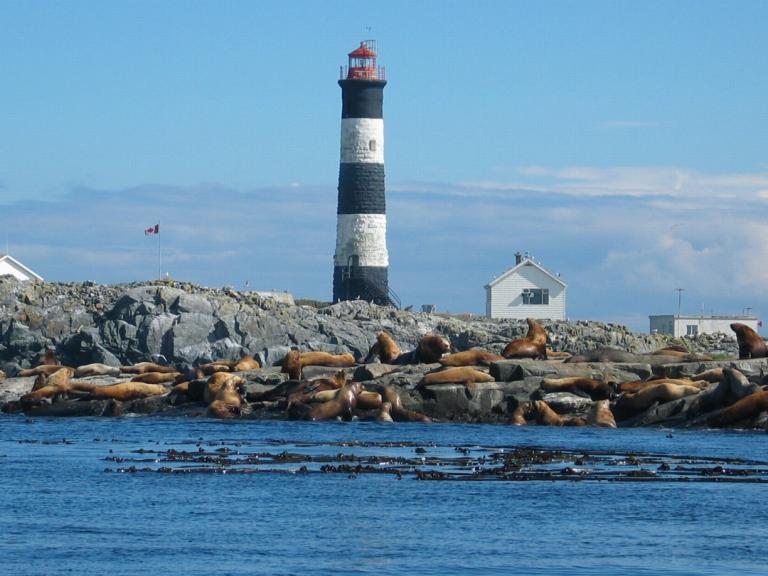
(Wikimedia Common public domain)
We went whale watching for several hours today. We saw only one humpback whale, but we saw (and spent much more time with) two or three groups of orcas or killer whales. And, at the end, we cruised over by Race Rocks, where, because of the high tidal current, an exceptional variety of marine life can be found, including mammals, sea birds, fish, various invertebrates, marine algae, and sea grass. There, we watched California and northern (or Steller) sea lions as well as harbor (or, since this is Canada, harbour) seals and elephant seals.

The onboard naturalist was superb, as good as I have seen. He talked about culture among the orcas, how such things as language and hunting techniques are passed on within — and differ between — various pods. He discussed their brains, and particularly their limbic system, which, he claimed, is larger and more complex than ours. In humans, the limbic system supports a variety of functions, including emotion, behavior, motivation, long-term memory, and olfaction. Orcas lack an olfactory sense (or sense of smell), but (again, according to him) they may have an emotional life that is more complex or, anyway, more powerful than ours. Their ups, he suggested, are higher than ours, and their downs lower. They are, for example, known to mourn very intensely. In particular, orca mothers will lament dead calves, and some have been known to carry them about in their mouths for days. And — orca society is matriarchal — even middle-aged males will mourn their mothers. He mentioned one case in which a heavily-studied orca individual, a male, mourned its mother and even fasted for long period of time, and then, for the rest of its life, would take circuitous routes that avoided the place where she had died. Remember that, above, the limbic system was said to be involved with both emotion and long-term memory.
At one point, one of our friends (a physician) asked the shipboard naturalist a question about the evolutionary relationship between pinnipeds and land animals. If I’m remembering correctly, the naturalist pointed out that Steller sea lion skulls are virtually identical to a grizzly bear’s. In fact, he said, sea lions are closer, genetically speaking, to grizzlies than are black bears. (If it wasn’t precisely that, it was very similar.) The evolutionary tree, he said, is a “mess.” I would love to have heard Tom Bethell’s response to that.
“He thinks the book is interesting,” complacently wrote one of my less-interesting critics about my invitation to read Bethell’s Darwin’s House of Cards, “but it’s not.” (This from a fellow who has, so far as I can tell, never laid eyes upon a copy of the book. Such unashamedly rigid conformism and lack of curiosity never ceases to amaze me.)
However, the book is interesting. But it certainly won’t interest people who are too dogmatic or too frightened to read it.
Posted from Victoria, British Columbia












